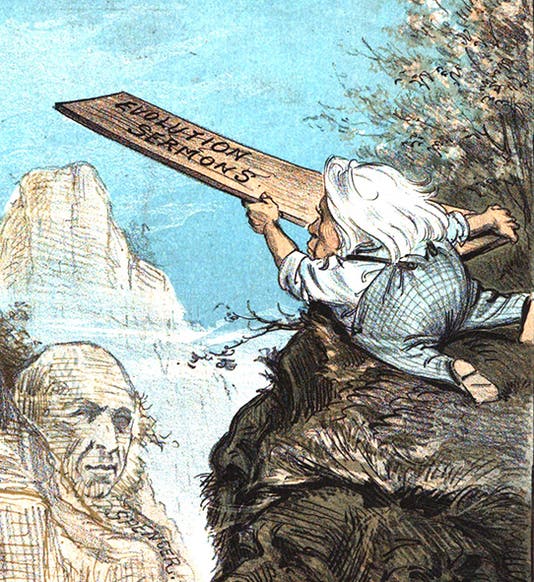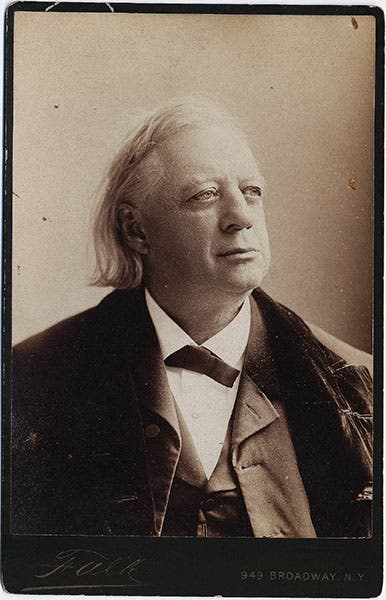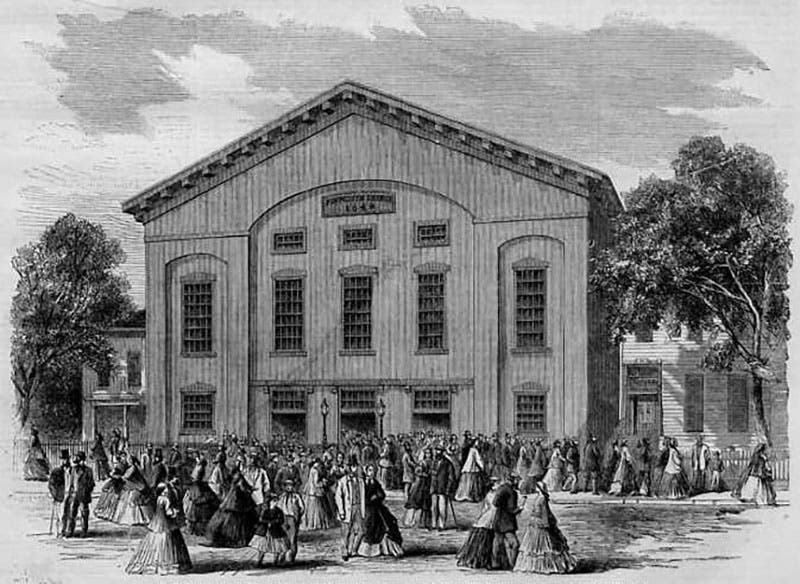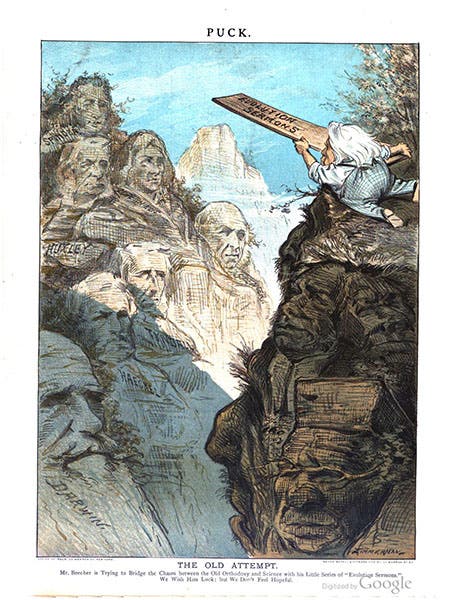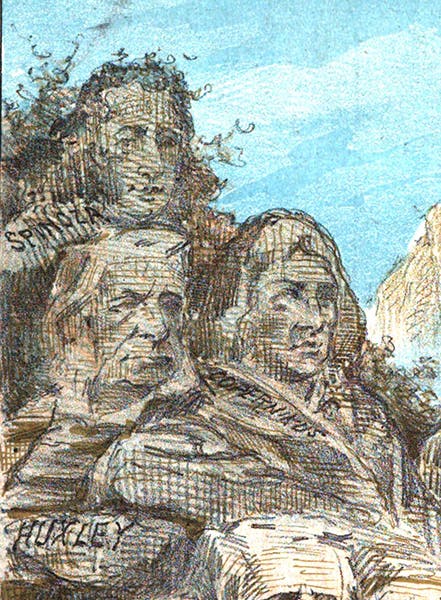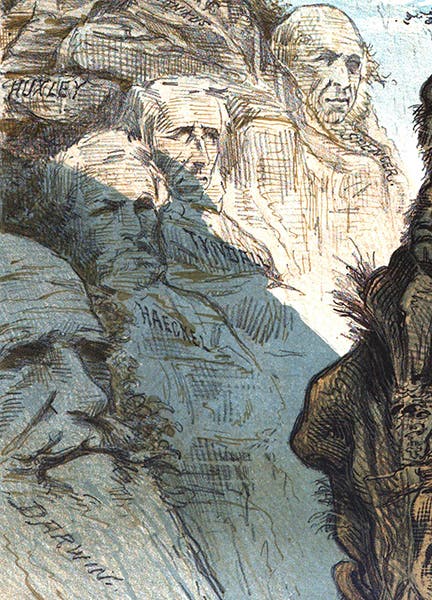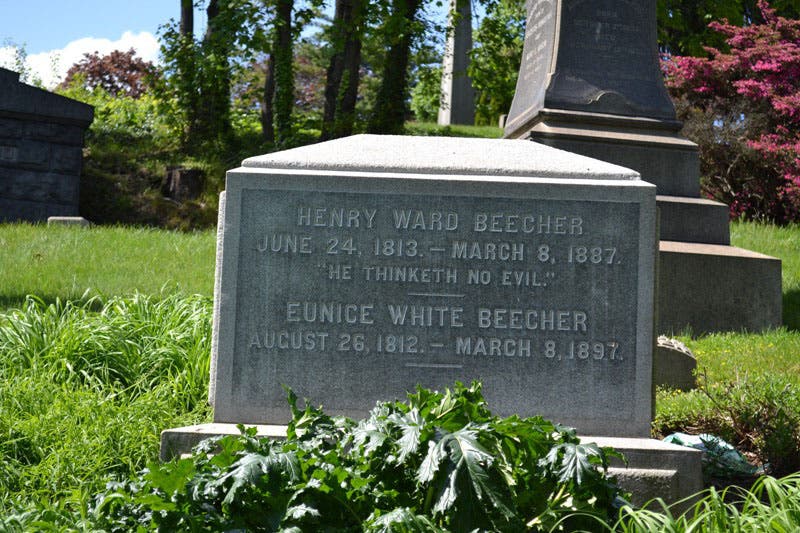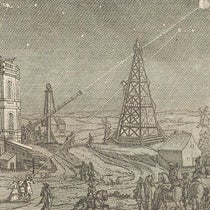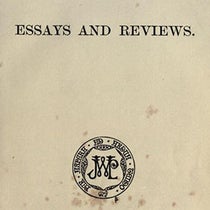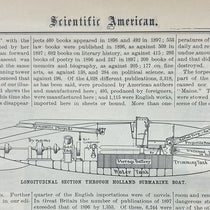Scientist of the Day - Henry Ward Beecher
Henry Ward Beecher, an American pastor and preacher, was born June 24, 1813. The younger brother of Harriet Beecher Stowe, he was a staunch abolitionist and advocate for women's suffrage. He became the pastor for the Congregationalist Plymouth Church in Brooklyn in 1847 (third image, below) and held the pulpit for forty years, until his death in 1887. He was said to be, in the 1860s, the third most famous man in the United States, after Abraham Lincoln and Ulysses S. Grant.
Beecher merits inclusion as a Scientist of the Day because, in the 1880s, he accepted Darwin's theory of evolution, thought that it was perfectly compatible with Christianity, and in 1885, delivered a series of eight sermons on Evolution and Religion, which he would then publish under that title later that year. The first sermon was delivered on May 24, 1885, and the last just eight weeks later, on July 10. We do not have the sermons in the Library, but I found the first seven online, and read a few of them, especially the second one of May 31, where he set out to explain evolution to his congregation. He did a decent job, not shying away from including humans in the evolutionary story. Since Beecher's fundamental tenet in all his sermons was "God is love," it is not surprising that he could accommodate a loving God to an evolving world. It is also not surprising that he failed to discuss Darwin's somewhat ungodly evolutionary mechanism, natural selection.
The New York Times ran a front-page story on Beecher's evolution sermons the day after the first sermon, in which they gave a precis of the sermon, and mentioned that the church was packed to the rafters by the eager audience. But a more pungent commentary came a week later, when Puck Magazine ran a cartoon on the back cover of their June 3 issue (see fourth image, below). The subject was Beecher and his "Evolution Sermons." In truth, the opportunity to display this cartoon is the main reason I wrote this post. I discovered it some years ago when I first became interested in Victorian caricatures of scientists, and I have never had the chance to show it to anyone until now. We do not hold any issues of Puck in the Library, but I found
this issue on Google Books, and was very surprised and pleased that the scan of the cartoon was high-resolution, so I could make close-up images to reveal the details. The cartoonist was Eugene "Zim" Zimmerman, about whom I now little, except that he drew for Puck for several years.
The cartoon shows the white-haired Beecher at top right, offering his "Evolution Sermons" to carved stone figures across a dividing chasm (see detail, first image). The divide is that between religion and science. The carved figures on Beecher's side of the chasm represent unnamed bishops and clergyman, and they are very much in the dark, except for Beecher. On the other side, looking like Mount Rushmore figures, except that Mount Rushmore was yet uncarved in 1885, are the faces of prominent evolutionists or revolutionaies. Starting from the top, they are: Baruch Spinoza, Thomas H. Huxley, Nicolaus Copernicus, Herbert Spencer, John Tyndall, Ernst Haeckel, and Charles Darwin (see details, fifth image, above, and sixth image, below). All are bathed in full sunlight, making Zimmerman's sympathies apparent.
The caption at the bottom (seventh image, just above) says: "THE OLD ATTEMPT. Mr. Beecher is Trying to Bridge the Chasm between the Old Orthodoxy and Science with his little series of "Evolution Sermons." We Wish Him Luck; But We Don't Feel Hopeful." You can see Zimmerman's signature just above the caption.
Beecher failed to convince the theologians, but that was never his goal. He took pains to distinguish theology from religion. Religion was what you felt in your heart, and whether the world was 6000 years old and static, or millions of years old and always changing, God’s love, and our love for God, was unaffected. And apparently his congregation agreed with him.
Beecher was buried at Green-wood Cemetery in Brooklyn, where he joined the company of George Catlin, DeWitt Clinton, Peter Cooper, Louis Moreau Gottschalk, Elias Howe, and Samuel F.B. Morse. Nathaniel Currier dropped in just a year later.
Dr. William B. Ashworth, Jr., Consultant for the History of Science, Linda Hall Library and Associate Professor emeritus, Department of History, University of Missouri-Kansas City. Comments or corrections are welcome; please direct to ashworthw@umkc.edu.

